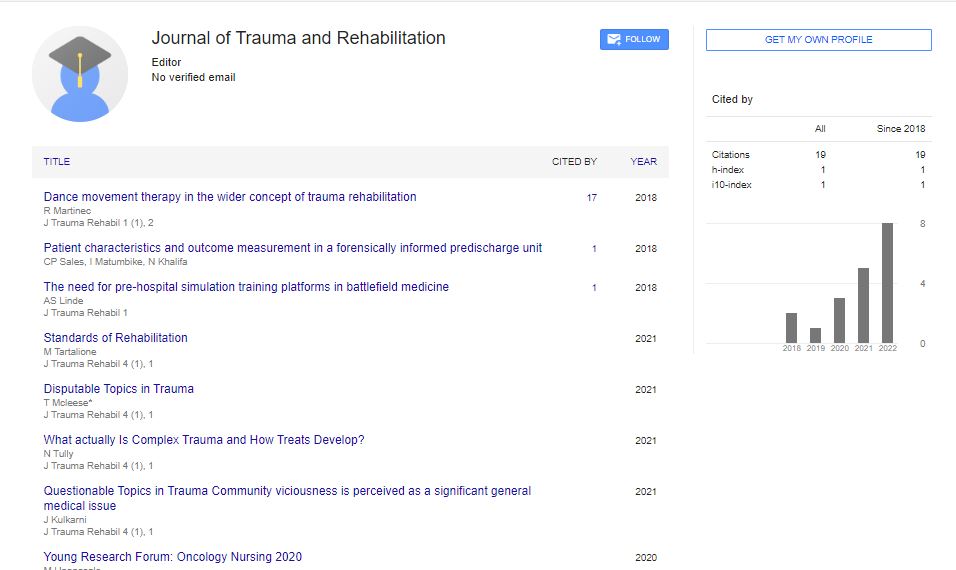Opinion Article, J Trauma Rehabil Vol: 6 Issue: 4
The Complex Repercussions of Psychological Trauma
Clarissa Trobliger*
1Department of Psychology, Kingston University London, London, United Kingdom
*Corresponding Author: Clarissa Trobliger,
Department of Psychology, Kingston
University London, London, United Kingdom
E-mail: claritrobli@kingston.ac.uk
Received date: 24 November, 2023, Manuscript No. JTR-24-127957;
Editor assigned date: 27 November, 2023, PreQC No. JTR-24-127957 (PQ);
Reviewed date: 11 December, 2023, QC No. JTR-24-127957;
Revised date: 18 December, 2023, Manuscript No. JTR-24-127957 (R);
Published date: 26 December, 2023, DOI: 10.4172/Jtr.1000142
Citation: Trobliger C (2023) The Complex Repercussions of Psychological Trauma. J Trauma Rehabil 6:4.
Description
Psychological trauma is a profound and often invisible wound that can reverberate through an individual's life, impacting their mental, emotional and physical well-being. Understanding the effects of psychological trauma require a nuanced exploration of the complex methods it shapes perceptions, behaviors and relationships. At its core, psychological trauma stems from exposure to events that overwhelm an individual's ability to manage, ensuring a persistent impact on their psychological landscape. The effects of trauma can manifest in a myriad of ways, ranging from immediate distress to long-term disruptions in functioning. One of the hallmark effects of psychological trauma is the alteration of perception, as individuals may develop a heightened sensitivity to potential threats in their environment.
The impact of psychological trauma on cognitive processes is profound, often leading to difficulties in concentration, memory and decision-making. Intrusive thoughts related to the traumatic event might take over an individual's attention, making it challenging to focus on daily tasks. Additionally, the fragmentation of memories associated with trauma can contribute to a sense of disorientation and difficulty in constructing a coherent narrative of the experience. Emotionally, individuals grappling with psychological trauma may experience a range of intense feelings, including fear, anxiety, sadness, anger and shame. These emotions may surface unexpectedly, triggered by reminders of the traumatic event or apparently unrelated stimuli. The emotional dysregulation often associated with trauma can strain relationships and impede a person's ability to connect with others on an emotional level.
The effects of psychological trauma extend beyond the realm of emotions, permeating the very core of an individual's identity and selfperception. Trauma can shatter one's sense of safety and trust, leading to a pervasive feeling of vulnerability. This altered perception of the self may contribute to the development of negative self-beliefs and a diminished sense of self-worth. Highly complex connection with the emotional and cognitive consequences of psychological trauma will bring changes in the human behavior. Individuals may adopt adaptive techniques, such as avoidance or numbing, as a means of managing the overwhelming emotions associated with trauma. These behaviors, while initially adaptive, can become entrenched and contribute to difficulties in functioning in various life domains.
The effects of psychological trauma are not confined to the individual; they extend to interpersonal relationships and societal dynamics. Traumatized individuals may struggle with forming and maintaining healthy connections, as trust and affection become formidable challenges. Moreover, the ripple effect of trauma can be observed in broader social contexts, influencing patterns of behavior and communication within families, communities and even entire societies. The physiological consequences of psychological trauma are another dimension that warrants consideration. The body's stress response system, designed to mobilize resources in the face of threat, becomes dysregulated in the aftermath of trauma. Prolonged exposure to stress hormones can contribute to physical health issues, including cardiovascular problems, immune system suppression and chronic pain. Assessing the effects of psychological trauma requires a comprehensive and integrative approach that considers the interconnectedness of these various dimensions. Clinicians and analysts employ a range of assessment tools, including self-report measures, clinical interviews, and observation, to gain insights into the individual's experience and the extent of the trauma's impact. However, it is crucial to recognize the subjective nature of trauma and the variability in how individuals respond to similar experiences.
Conclusion
Moreover, the assessment process should be sensitive to cultural and contextual factors, as the expression of trauma and its effects may manifest differently across diverse populations. Culturally competent assessment practices contribute to a more accurate understanding of the individual's experience and facilitate the development of customized interventions. Assessing the effects of psychological trauma requires a comprehensive examination of its impact on cognition, emotion, behavior, identity, relationships and physiology. Recognizing the pervasive and interconnected nature of these effects is essential for developing effective interventions that address the multifaceted dimensions of trauma. Through a compassionate and comprehensive assessment, individuals can embark on a path of healing and resilience, navigating the complex aftermath of psychological trauma towards a renewed sense of well-being.
 Spanish
Spanish  Chinese
Chinese  Russian
Russian  German
German  French
French  Japanese
Japanese  Portuguese
Portuguese  Hindi
Hindi 